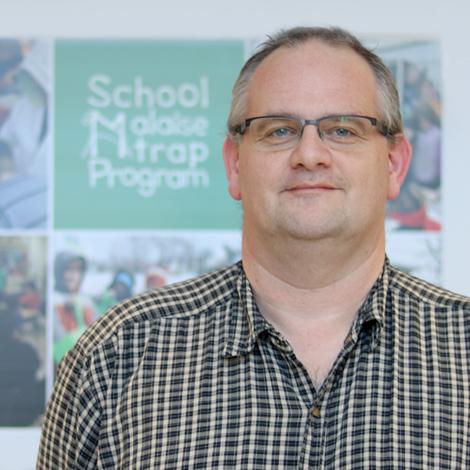 High school students will help U of G scientists collect valuable pollinator data from their schoolyards under “Bees@School,” a new University of Guelph-led program launched with funding announced today by the Natural Sciences and Engineering Research Council (NSERC).
High school students will help U of G scientists collect valuable pollinator data from their schoolyards under “Bees@School,” a new University of Guelph-led program launched with funding announced today by the Natural Sciences and Engineering Research Council (NSERC).
U of G scientists are setting up and monitoring “bee hotels” at schools in Waterloo and Toronto for this first pilot year. The aim is to keep track of pollinator activity in areas beyond where researchers normally work, to collect data about what bees are around, where they’re getting their food and other useful data that will help build a broader picture of pollinator health in Canada.
“Scientists are data-hungry,” said Dirk Steinke, an adjunct professor in the Department of Integrative Biology who came up with the idea for the program.”We’d like to get more information as a baseline about wild bee pollinators. That would be the dream: to learn who is out there, where are they and understand species distribution and what they are doing, what food they eat.”
The funding was announced Aug. 24 at Simon Fraser University in Burnaby, B.C., and is part of NSERC’s Promo Science program, which supports organizations working with young Canadians to promote understanding of science and engineering through hands-on learning. U of G will receive $36,300 a year for three years to run the program.
Steinke said the bee hotels are tube-like structures used by female bees as a home for their developing larvae. The bees store food inside the structure for the larvae and often block its entrance to protect them.
U of G researchers will use DNA barcoding technology developed at the University to identify the larval species and the food stored by the females.
“This gives us an idea of what the bees feed on and which flowers they visit,” said Steinke.
Scientists will also test for parasites in the bee hotels to get a better sense of the larger bee ecosystem.
Steinke said the pilot program will allow the researchers to compare how the bee hotels work in different environments — in this case, one urban, the other in a Waterloo nature reserve.
He hopes to expand the program across Canada this year. He said the program engages students in hands-on learning about pollination and plant-insect interactions, and about how environmental changes and land uses affect bees.
“The one thing I really hope is that the students take away the idea that science is not a dry subject confined to classrooms and dry laboratory experiments,” said Steinke. “You can go out, do something, and connect it to something that really makes a difference.”